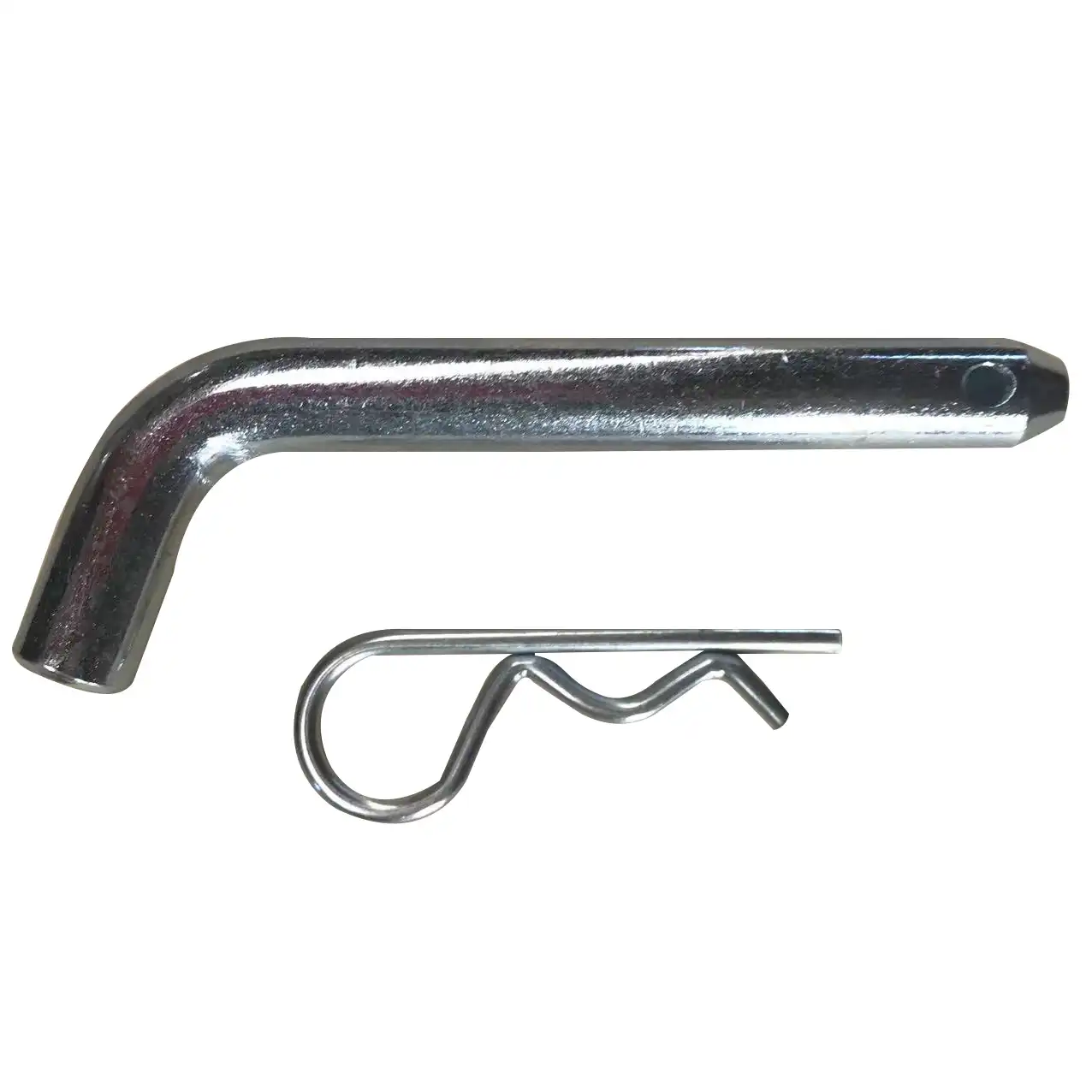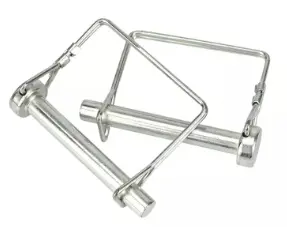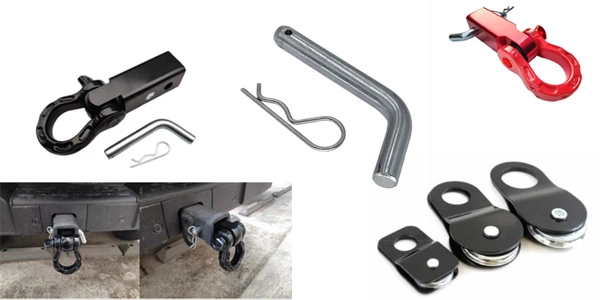Can you tow with a locking hitch pin?
2025-09-25 14:44:47
Picture this: You're ready to hit the road for a long-awaited camping trip with your travel trailer in tow, but as you're making your final checks, doubt creeps in. Will that locking hitch pin really keep your trailer securely attached? This uncertainty has plagued countless drivers, and for good reason. The answer is absolutely yes - you can tow with a locking hitch pin, but only when you choose the right one and use it correctly. A quality locking hitch pin not only secures your trailer but also provides peace of mind through enhanced theft protection and reliable connection strength. Understanding the proper specifications, installation procedures, and maintenance requirements can mean the difference between a safe journey and a roadside disaster.

Understanding Locking Hitch Pin Fundamentals for Towing
The foundation of safe towing begins with understanding what a locking hitch pin actually does and how it differs from standard hitch pins. A locking hitch pin serves as the critical connection point between your vehicle's receiver hitch and the trailer's ball mount or other towing accessories. Unlike traditional pins that rely solely on a simple clip mechanism, locking hitch pins incorporate sophisticated locking systems that require keys or combination mechanisms for removal. When evaluating whether you can tow with a locking hitch pin, the most crucial factor is the pin's load capacity and construction quality. Professional-grade locking hitch pins are manufactured from high-strength steel and undergo rigorous testing to ensure they can handle substantial towing loads. For instance, heavy-duty locking hitch pins can withstand up to 10,000 pounds of towing weight, making them suitable for most recreational and commercial towing applications. The key lies in matching the pin's specifications to your specific towing requirements. The locking mechanism itself adds an extra layer of security without compromising structural integrity. Modern locking hitch pins feature weather-resistant designs with zinc-coated or powder-coated finishes that prevent corrosion and ensure long-lasting performance. This durability is essential for towing applications where the pin must maintain its strength under constant stress and varying weather conditions.
-
Material Composition and Strength Requirements
The material composition of a locking hitch pin directly impacts its towing capability and longevity. High-quality locking hitch pins are typically constructed from Q235B steel or similar high-strength materials that provide exceptional tensile strength and resistance to deformation. This material choice ensures the pin can handle the dynamic forces encountered during towing, including sudden stops, turns, and road vibrations. Manufacturing processes play an equally important role in determining pin reliability. Progressive stamping, heat treatment, and precision machining contribute to creating pins with consistent dimensions and superior strength characteristics. The best locking hitch pins undergo multiple quality control inspections to verify dimensional accuracy and load-bearing capacity before reaching consumers. Surface treatments such as galvanizing, powder coating, or anodizing protect the steel core from environmental factors that could weaken the pin over time. These protective finishes are particularly important for locking hitch pins since they contain mechanical components that must operate smoothly throughout the pin's service life.

Heavy-Duty Locking Hitch Pin Applications and Load Capacities
Heavy-duty locking hitch pins represent the pinnacle of towing security and reliability, designed specifically for demanding applications where standard pins might fail. These specialized pins feature reinforced construction, enhanced locking mechanisms, and higher load ratings that make them ideal for commercial towing, construction equipment transport, and heavy recreational vehicle applications. The versatility of heavy-duty locking hitch pins extends across multiple industries and applications. In automotive towing scenarios, these pins provide reliable connections for travel trailers, boat trailers, and equipment haulers. Construction companies rely on them to secure machinery trailers and material transport equipment. Agricultural operations use them to connect farming implements and livestock trailers to tractors and utility vehicles. Load capacity considerations become critical when selecting a heavy-duty locking hitch pin for specific towing applications. Pins rated for 10,000 pounds or more incorporate thicker cross-sections, premium steel alloys, and reinforced locking mechanisms that maintain their integrity under extreme conditions. The pin diameter, typically ranging from 5/8 inch to 3/4 inch, must match the receiver tube specifications to ensure proper fit and load distribution.
-
Professional Installation and Safety Protocols
Proper installation of heavy-duty locking hitch pins requires attention to several critical factors that directly impact towing safety. The pin must pass completely through both the receiver tube and the accessory shank, with sufficient clearance to accommodate the locking mechanism. Inadequate pin length can result in incomplete engagement, while excessive length may interfere with vehicle operation or create safety hazards. Pre-installation inspection procedures should verify that both the receiver tube and accessory shank are clean, undamaged, and properly aligned. Any debris, corrosion, or deformation in the pin holes can prevent proper installation and compromise the connection's integrity. Regular maintenance of these components extends their service life and ensures consistent performance. The locking mechanism itself requires periodic attention to maintain smooth operation and security. High-quality heavy-duty locking hitch pins include weather seals and protective covers that shield the lock cylinder from moisture, dirt, and road salt. Proper lubrication of moving parts prevents binding and ensures the key operates smoothly even after extended exposure to harsh conditions.
Secure Towing Solutions with Advanced Locking Mechanisms
Advanced locking mechanisms in modern locking hitch pins provide multiple layers of security that go far beyond traditional clip-style fasteners. These sophisticated systems incorporate pick-resistant cylinders, hardened steel construction, and tamper-evident designs that deter theft while maintaining ease of use for authorized operators. The security advantages of advanced locking hitch pins become particularly apparent in high-risk environments where trailer theft is a concern. Commercial operations, construction sites, and recreational vehicle storage areas benefit significantly from the deterrent effect of visible locking mechanisms. The combination of physical security and visual deterrence creates a comprehensive anti-theft system that protects valuable equipment and trailers. Operational convenience remains a priority in advanced locking mechanisms, with many featuring quick-release designs that allow rapid connection and disconnection without sacrificing security. Some systems incorporate master key capabilities for fleet operations, while others offer combination locks that eliminate the need for physical keys. These features streamline operational workflows while maintaining the highest levels of security.
-
Integration with Fleet Management Systems
Modern locking hitch pin systems can integrate with broader fleet management and security protocols to provide comprehensive asset protection. Digital tracking capabilities, when combined with secure locking mechanisms, create audit trails that document equipment usage and movement patterns. This integration proves valuable for commercial operators who need to monitor trailer utilization and ensure compliance with safety regulations. The standardization of locking hitch pin specifications across fleet vehicles simplifies maintenance procedures and reduces inventory requirements. Fleet managers can maintain smaller stocks of replacement parts while ensuring compatibility across diverse vehicle types and towing applications. This standardization also facilitates training programs that ensure all operators understand proper installation and operation procedures. Quality assurance protocols for fleet-grade locking hitch pins typically exceed consumer-grade standards, with additional testing for fatigue resistance, corrosion protection, and mechanical durability. These enhanced specifications reflect the demanding operating conditions and high utilization rates common in commercial applications.
Quality Manufacturing Standards and Certification Requirements
Manufacturing standards for locking hitch pins encompass multiple aspects of design, production, and testing that ensure consistent quality and reliability. ISO 9001 certification demonstrates a manufacturer's commitment to systematic quality management, covering everything from raw material procurement to final product inspection. This certification provides assurance that each locking hitch pin meets established performance criteria. Environmental management standards such as ISO 14001 address the ecological impact of manufacturing processes, ensuring that production methods minimize waste and environmental contamination. For locking hitch pins, this includes responsible sourcing of raw materials, efficient use of energy and water, and proper disposal of manufacturing byproducts. Occupational health and safety management systems certification under OHSAS 18001 standards ensures that manufacturing facilities maintain safe working conditions for employees. This certification reflects a commitment to worker safety that often translates into higher quality products through improved attention to detail and process control.
-
Testing Protocols and Performance Validation
Comprehensive testing protocols validate locking hitch pin performance across multiple operational parameters, including load capacity, fatigue resistance, corrosion protection, and environmental durability. Destructive testing determines ultimate failure loads, while cyclic testing evaluates performance under repeated loading conditions that simulate real-world usage patterns. Environmental testing exposes locking hitch pins to accelerated aging conditions that replicate years of outdoor exposure in compressed timeframes. Salt spray testing, thermal cycling, and UV exposure help identify potential weaknesses in protective coatings and base materials before products reach the market. Lock mechanism testing verifies the security and durability of locking systems under various operating conditions. This includes evaluation of key strength, cylinder wear resistance, and resistance to picking or forced entry attempts. The combination of mechanical and security testing ensures that locking hitch pins provide reliable performance throughout their intended service life.
Professional Customization Services for Specialized Applications
Customization services for locking hitch pins address the diverse requirements of specialized applications that cannot be met by standard product offerings. Professional manufacturers offer dimensional modifications, material upgrades, and specialized coatings that optimize performance for specific operating environments and load requirements. Engineering consultation services help customers identify the optimal locking hitch pin specifications for their unique applications. This process involves analysis of loading conditions, environmental factors, security requirements, and operational constraints to develop customized solutions that maximize performance and reliability. Prototype development and testing services allow customers to validate customized designs before committing to large-scale production. This approach reduces the risk of specification errors and ensures that final products meet all performance requirements. Rapid prototyping capabilities enable quick iterations and refinements that optimize design efficiency.
-
OEM Integration and Supply Chain Management
Original Equipment Manufacturer (OEM) integration services facilitate the incorporation of locking hitch pins into larger systems and equipment packages. This includes dimensional coordination, material compatibility verification, and supply chain synchronization that ensures components arrive when needed for assembly operations. Supply chain management services encompass procurement, inventory management, and logistics coordination that optimize cost and delivery performance. Professional manufacturers maintain strategic relationships with raw material suppliers and shipping partners that enable competitive pricing and reliable delivery schedules. Quality management systems for OEM applications typically include additional documentation, traceability, and testing requirements that support customer quality assurance programs. This enhanced level of service ensures that locking hitch pins integrate seamlessly into final products and meet all applicable industry standards.

Conclusion
The answer to "Can you tow with a locking hitch pin?" is a resounding yes when you select high-quality products and follow proper installation procedures. Locking hitch pins provide essential security and reliability for towing applications across diverse industries and use cases.
Cooperate with Qingdao RUIRUI Machinary Co., LTD.
As a leading China locking hitch pin factory and China locking hitch pin supplier, Qingdao RUIRUI Machinery Co., LTD offers comprehensive solutions for all your towing security needs. Established in 2016, our China locking hitch pin manufacturer specializes in producing high-quality trailer accessories with ISO-certified manufacturing processes.
Our facility features eight automated production lines with an annual output of 130,000 pieces, ensuring reliable supply for China locking hitch pin wholesale requirements. We offer locking hitch pin for sale with customizable specifications including Q235B steel construction, zinc coating, and load capacities up to 10,000 pounds. Our competitive locking hitch pin price reflects our commitment to providing value without compromising quality.
With over 15 years of management experience, our High Quality locking hitch pin products are exported to more than 80 countries worldwide. Contact us at info@qdkshd.com for technical consultation, OEM support, and bulk procurement solutions. Experience the RUIRUI difference in trailer security solutions.
FAQ
Q: What is the maximum towing capacity for a locking hitch pin?
A: High-quality locking hitch pins can handle up to 10,000 pounds of towing weight when properly matched to vehicle specifications.
Q: Are locking hitch pins more reliable than standard hitch pins?
A: Yes, locking hitch pins offer enhanced security and typically feature superior construction materials compared to basic pins.
Q: How do I choose the correct locking hitch pin size?
A: Measure your receiver tube opening and verify the required pin length to ensure complete engagement through both receiver and accessory.
Q: Can locking hitch pins be used with all trailer types?
A: Locking hitch pins are compatible with most trailer applications when properly sized for the receiver class and load requirements.
References
1. "Trailer Hitch Safety Guidelines and Best Practices" - National Highway Traffic Safety Administration
2. "Heavy-Duty Towing Equipment Standards and Testing Procedures" - Society of Automotive Engineers
3. "Corrosion Protection for Automotive Fasteners and Hardware" - American Society for Testing and Materials
4. "Fleet Management Best Practices for Trailer Security Systems" - Commercial Vehicle Safety Alliance
Send Inquiry
You may like
